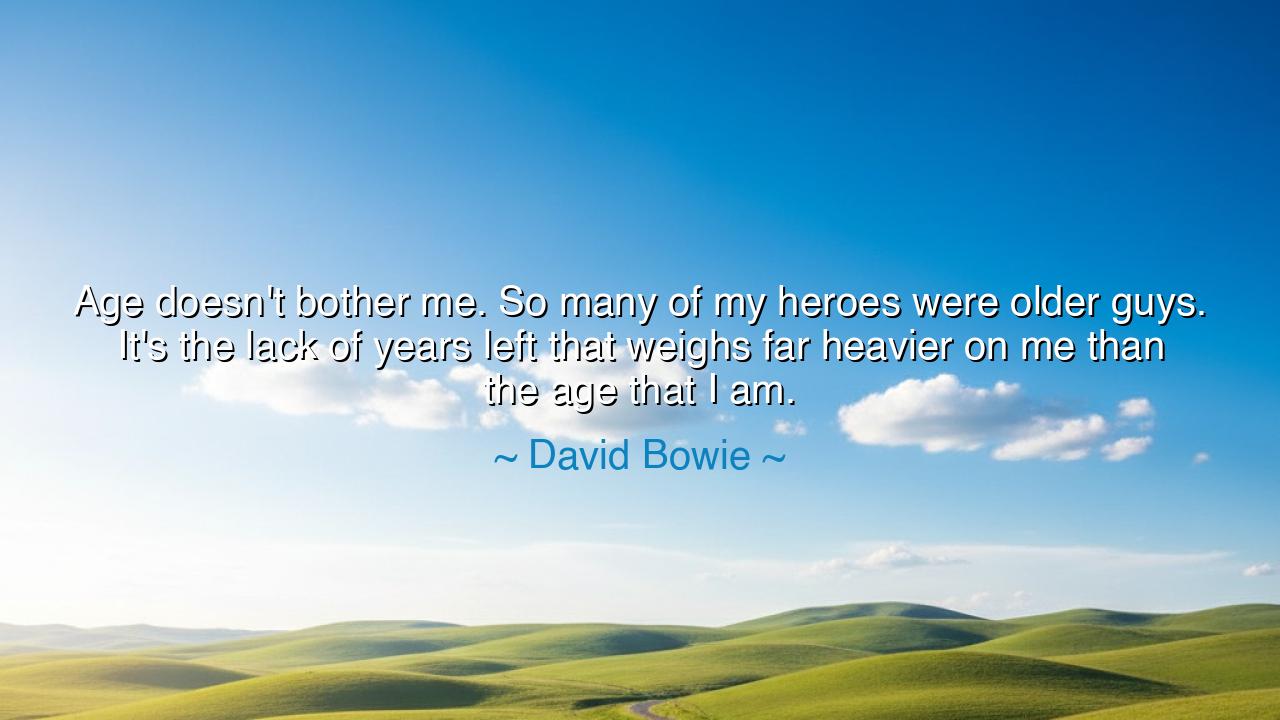
Age doesn't bother me. So many of my heroes were older guys. It's
Age doesn't bother me. So many of my heroes were older guys. It's the lack of years left that weighs far heavier on me than the age that I am.






"Age doesn't bother me. So many of my heroes were older guys. It's the lack of years left that weighs far heavier on me than the age that I am." These words from David Bowie reveal a profound truth about how we perceive time, legacy, and the human condition. Bowie, a man whose life and career were filled with reinvention and creative exploration, acknowledges that age itself does not trouble him. Instead, it is the knowledge that life, no matter how vibrant, is finite that causes him concern. This quote reflects the underlying fear that many feel as they approach the latter stages of life—not the physical signs of age, but the limited time left to achieve their deepest aspirations. Bowie’s insight speaks to the universal tension between our youthful ambition and the inevitable reality of time’s passage.
In the wisdom of the ancients, the concept of time was often treated as a double-edged sword. Heraclitus spoke of the impermanence of all things, famously stating that "everything flows" and that change is the only constant. The ancients understood that age was not simply about the physical body wearing down but about the fleeting nature of life itself. Plato, in his Phaedrus, argued that our awareness of mortality should compel us to live wisely and purposefully, as we cannot predict how many years we have left to achieve our greatest potential. Bowie's reflection on how the passing of years feels more weighty than aging itself echoes this ancient understanding—that it is not the advance of age that is the most difficult, but the shortness of time that we are allowed to make our mark on the world.
The life of Leonardo da Vinci offers a poignant example of how the awareness of time’s limitations can shape a person's legacy. Da Vinci, whose genius spanned multiple disciplines, spent much of his life pushing the boundaries of art, science, and engineering. Yet, as he grew older, he became increasingly aware of how much he had yet to achieve, and the fear of wasted time began to weigh heavily on him. Da Vinci’s notebooks are filled with sketches, ideas, and inventions that were never fully realized, and some scholars believe he may have experienced a deep sense of regret about his inability to complete all that he envisioned. For da Vinci, as for Bowie, the awareness of time—not the physical decline—was the greatest burden.
Marcus Aurelius, the Roman Emperor and Stoic philosopher, reflected deeply on the passage of time in his Meditations. He understood that life was fleeting, and his writings are filled with reminders to live fully, to embrace each moment, and to focus on what truly matters. For Aurelius, the key to dealing with time’s brevity was to live with virtue and to accept the inevitability of life’s transience. He did not obsess over age or what he had left in terms of years but focused instead on living with purpose, courage, and integrity. His wisdom provides a counterpoint to Bowie's concerns about the passing of years: the recognition that while we cannot control the time we have left, we can control how we live in the time we are given.
Bowie’s quote also speaks to the uncertainty of time. We never know how many years we have left to make an impact, and this is something that can be frightening and motivating at the same time. Consider the life of Mahatma Gandhi, who, despite his late start in the political world, became one of the most influential figures of the 20th century. Gandhi was in his forties before he fully embraced his role in the Indian independence movement. At that time, many would have believed that his age would be a limitation, but it was his wisdom, dedication, and the fact that he used the remaining years of his life with purpose that made him one of the most important figures in world history. Like Gandhi, the real task is not to worry about how many years we have left, but to make each one count.
The lesson from Bowie’s words is simple but profound: it is not the aging process itself that burdens us, but the awareness of life’s limits. The real challenge lies not in growing older, but in feeling the weight of the time left and how we use it. We must be ever-conscious of how precious time is, not just in terms of quantity, but in quality. Each moment is a chance to create, to connect, and to leave a legacy. This requires intention, purpose, and a deep commitment to living fully.
In practical terms, we should ask ourselves: What am I doing with the time I have? Am I focusing on the future so much that I’m neglecting the present? Am I letting age or the fear of aging prevent me from taking action on my dreams, goals, and relationships? Like Marcus Aurelius, we should live each day with a sense of purpose, using the time we have wisely, knowing that it is the way we live—not the years that pass—that defines our legacy. We must live with urgency, yes, but also with acceptance, knowing that while we cannot control the passage of time, we can always choose how we fill it.






AAdministratorAdministrator
Welcome, honored guests. Please leave a comment, we will respond soon